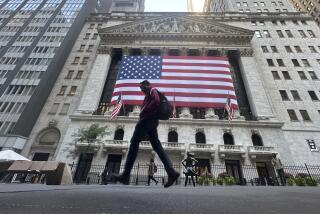BofA, Citigroup Ring Up Big Increases in Earnings
- Share via
Bank of America Corp. and Citigroup Inc. trounced Wall Street’s expectations Monday with robust second-quarter earnings, mixing positive news about commercial loans and investment banking with another big quarter of returns on mortgage lending and credit cards.
Charlotte, N.C.-based BofA, the No. 1 bank in California based on deposits and branches, said profit rose to $2.74 billion, up 23% from the second quarter of 2002 and far surpassing analysts’ estimates.
Citigroup, the world’s largest financial services firm, also beat expectations with $4.3 billion in earnings, a 5% gain from last year. New York-based Citigroup further surprised Wall Street by hiking its dividend 75%, causing investors to bid up the stocks of such rivals as Wells Fargo & Co. and Bank One Corp. on expectations that they also would increase shareholder payouts.
Investors took the earnings reports as a “buy” signal not only for banks but also for many other stocks.
“When banks like Citi and Bank of America report, you’re seeing a snapshot of a broad piece of the economy,” said Lehman Bros. analyst Brock Vandervliet. “To see not just good earnings but earnings that crushed all expectations is a tremendously positive sign.”
A key index of 24 leading banks and savings and loans rose 2.2% on Monday to its highest close since May 17, 2002.
Citigroup, the index’s largest component, gained 97 cents to $47.12 on the New York Stock Exchange, its highest close since January 2001. Its $4.3 billion in earnings, or 83 cents a share, compared with net income of $4.1 billion, or 78 cents, in the second quarter of 2002. Analysts surveyed by Thompson First Call had expected 80 cents a share for the latest quarter.
BofA, the second-largest component in the bank index, rose 58 cents to $83.46 on the NYSE, its highest close in almost five years. The bank’s profit was $1.80 a share, compared with analysts’ expectations of $1.57. A year earlier, BofA earned $2.22 billion, or $1.40 a share.
The rally in bank shares helped pull the overall market higher. The Dow Jones industrial average was up almost 160 points before a late sell-off trimmed its gains for the day.
Citigroup’s increase of its quarterly dividend from 20 cents to 35 cents a share is part of a trend in response to congressional passage in May of legislation reducing the maximum tax rate on dividend income to 15% from 38.6%.
With profits at record levels, banks have helped lead the way: BofA raised its quarterly dividend 25% to 80 cents last month, and First Republic Bank of San Francisco declared its first dividend Monday, a quarterly payout set at 12.5 cents a share.
Discussing his bank’s methods of rewarding shareholders, Citigroup finance chief James Hance told analysts that the tax law had made paying dividends just as attractive as buying back shares.
The rewards can be great: Saudi Prince Al Waleed ibn Talal, Citigroup’s largest stockholder, with more than 266 million shares, will see his annual payout rise by about $160 million to $372.6 million. Citigroup Chief Executive Sanford I. Weill, who owns more than 22 million shares, will be paid an additional $13.5 million a year for a pretax total of $31.4 million.
Such hefty dividend payouts drew some criticism. Vandervliet said Citigroup should consider using the money to make acquisitions in potential expansion areas, such as its purchase last year of California Federal Bank parent Golden State Bancorp Inc., which gave it a large retail footprint in California.
But investors generally embraced the dividend news and hoped for more. Putnam Lovell NBF analyst Jennifer Thompson noted that banks such as Wells Fargo and Bank One have relatively low dividends along with the capacity to increase their payouts.
Shares in San Francisco-based Wells, which is due to report its earnings today, closed up $1.15 at $53.03. Chicago-based Bank One, whose earnings report is scheduled for Wednesday, rose by $1.16 per share to close at $39.21. Both trade on the NYSE.
Vandervliet noted that the strong earnings for BofA and Citigroup came despite shrinking net interest margins -- the difference between what the banks pay on deposits and what they earn on loans. This “spread” narrowed last quarter as loan interest rates fell while banks were unable to cut further the rock-bottom interest they were paying on deposits.
For example, BofA’s net interest margin fell to 3.33 percentage points in the second quarter from 3.75 percentage points in the same period a year ago.
That decline was offset by what Vandervliet called “monumental results from mortgage banking,” along with lower set-asides to cover bad loans.
More to Read
Inside the business of entertainment
The Wide Shot brings you news, analysis and insights on everything from streaming wars to production — and what it all means for the future.
You may occasionally receive promotional content from the Los Angeles Times.











